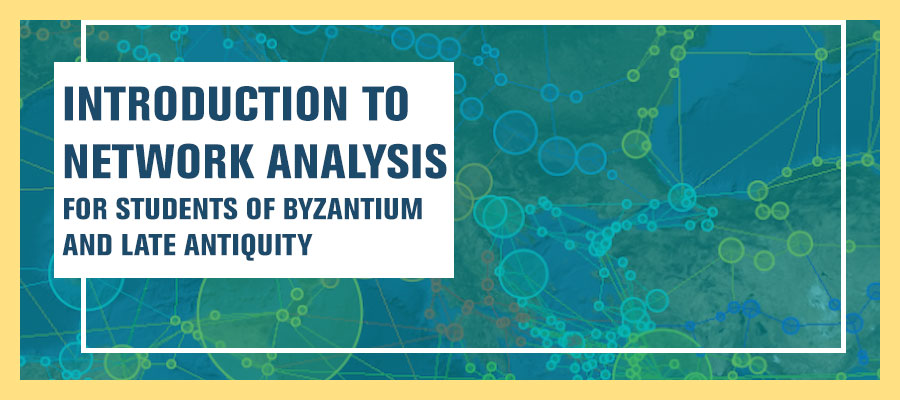Introduction to Network Analysis for Students of Byzantium and Late Antiquity
This online workshop will provide both an overview of basic concepts of network theory and their application in historical and archaeological research (with a focus on the study of Late Antiquity and Byzantium) as well as an introduction into software tools and practical network analysis. The aim of the workshop is to enable students to critically evaluate the growing number of studies using network analysis as well as to apply these tools themselves in a well-reflected and productive way.
All participants will receive in advance a selection of preparatory readings, a bibliography (for further research), download links for the necessary software tools and sample data sets, which will be used in the practical exercises. Every participant should have a computer with the software and sample data pre-installed. In addition, there will also be opportunity to discuss the potential of network tools for individual research projects of the participants.
Course Outline
- Friday, October 7, 11 am–1 pm (EDT): Nodes, Links and Degree. Basic concepts of quantitative network analysis
- Friday, October 14, 11 am–1 pm (EDT): Papyri, potsherds, people, sites, texts, relations. Theoretical considerations and examples of historical and archaeological network analysis
- Friday, October 21, 11 am–1 pm (EDT): From data to network models. Organization, processing, and entering of relational data. Practical work with data and software, part I.
- Friday, October 28, 11 am–1 pm (EDT): From the model to results. Analysis, visualization, and interpretation of network graphs. Practical work with data and software, part II.
Workshop Checklist
- Laptop
- Good internet connection
- Software pre-installed
- Sample data sets pre-installed
The workshop is limited to 15 participants. Registration is first come, first served.
REGISTRATION FOR THIS WORKSHOP IS CLOSED.
The time commitment for this workshop is eight hours. It will meet every Friday in October from 11:00 am–1:00 pm (EDT). Participants are required to attend all sessions.
Who is eligible?
- Graduate students and early career researchers (PhD received after October 2014) in the field of Byzantine studies. Students enrolled in graduate programs in North America and early career researchers working in North America will be given priority. Graduate students and early career researchers outside of North America will be placed on a waiting list and contacted if space is available.
- All participants must be BSANA members. BSANA membership is free for graduate students and early-career contingent scholars who have earned their PhD within the last eight years and who do not hold a permanent or tenure-track appointment. If you are not already a BSANA member, please complete the BSANA Membership Form before registering for the workshop. Your membership status will be confirmed before your space in the workshop is confirmed.
This workshop is part of the partnership between the Mary Jaharis Center for Byzantine Art and Culture and the Byzantine Studies Association of North America to provide digital humanities training opportunities to graduate students and early career researchers.
